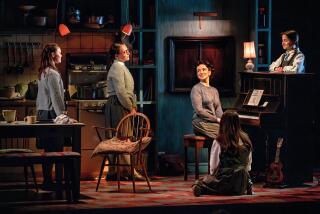Review: Documentary reveals Zoey Tur as a news pioneer — and toxic male — before her transition
- Share via
More than 30 years ago, the phrase “If it bleeds, it leads” entered the lexicon thanks to a New York Magazine article excoriating ratings-hungry local TV news programs for kicking off their broadcasts with the most violent and sensational stories.
But as the invigorating, warts-and-all documentary “Whirlybird” recounts, Zoey Tur had already put that ethos into practice earlier that decade. That was when Tur, who was not yet living openly as a trans woman, and then-wife Marika Gerrard co-founded the Los Angeles News Service, through which the intrepid, pioneering stringers would race to provide breaking-news footage — the more electrifying and action-packed the better — to the city’s news outlets.
The adrenalin-fueled couple would also come to realize that what might be considered a great news story was often based on someone else’s tragedy. Yet as “slaves to breaking news,” Zoey and Marika kept feeding their burgeoning business, eventually adding a game-changing helicopter to the equation so they could get to stories while they were still in progress. Zoey was the pilot and reporter; Marika served as cameraperson, often precariously hanging out of the helicopter cockpit — at the hectoring and uncompromising Zoey’s behest — to get the best, most dramatic shots.
The talented couple was eventually hired by such radio outlets as KFWB and KNX and, later, TV stations KCOP and KCBS. Over the course of two decades, they shot and covered such landmark L.A. events as the 1992 riots, the Northridge earthquake and the O.J. Simpson police chase. They also famously hovered over Sean Penn and Madonna’s 1985 Malibu wedding.
Director Matt Yoka (he also wrote and co-edited) culled and digitized these and countless other vivid moments from Zoey and Marika’s massive video archive and wove them into a masterful visual tapestry of both Los Angeles and a couple who, as Zoey puts it, “fell in love to the heartbeat of the city.”
The couple’s children, Katy (now an MSNBC anchor married to “CBS This Morning” co-host Tony Dokoupil) and Jamie (now a doctor), grew up in front of a video camera, so we’re also treated to a wealth of clips of them as bright, interested kids interacting with each other and their super-busy parents.
But there was a monster in their midst. As documented on the news helicopter footage and beyond, Zoey, before her gender reassignment surgery in 2014, was angry, hair-trigger and verbally abusive — just like her father (though Zoey’s dad also repeatedly inflicted physical harm). As latter-day Zoey says in candid, deeply wistful interview bits, “My greatest fear was becoming my dad, and I’ve become my dad.”
Meanwhile, in the mid-1990s, Tur’s mother, Judy, seen here in many archival clips and credited as being the glue that held Marika and Zoey’s business and family together, died, leaving a gaping hole in Zoey’s fraught life. Shortly after, the 35-year-old suffered a heart attack.
From the clips here, Marika seemed to bear the brunt of her husband’s stress and fury, and worked to stay calm as Tur cruelly, loudly berated her photographic skills. The pair, who won numerous awards including three TV News Emmys, divorced in 2003.
There was, however, a secret that Zoey was carrying around that may have informed her erratic and toxic behavior: She had long struggled with gender dysphoria and was caught between her true self and birth-assigned gender. (Tur summarily explains of her past: “Testosterone in my system equaled a—.”)
Unfortunately, this otherwise gripping, deftly constructed film doesn’t delve fully enough into this key part of Zoey’s story and, as presented, may mislead uninitiated viewers into linking gender dysphoria with rage, rebellion, violence or any other of Zoey’s extreme or destructive, pretransition traits. Obviously, everyone’s journey is different.
We also don’t learn much about the 10-year period between the couple’s split and Zoey’s coming out as transgender, though Zoey’s trip to a Burning Man festival, which celebrates self-expression, was apparently formative. Nor do we get a real sense of how the couple managed their young children’s daily care, given how much time they spent chasing the next breaking story.
Yoka’s contemporary chats with Zoey (now living in the Santa Cruz Mountains), Marika, Katy and Jamie, although emotional and compelling, reveal few specifics about the current state of the family as a whole. One clue may be that they are all interviewed separately. Another: Zoey heartbreakingly says she’s “pretty much already dead” to her kids, but that could have also used more elaboration. (Katy and Zoey reportedly did not speak for several years, though Katy has publicly denied that the break was because of Zoey’s transition.)
Lawrence Welk III (yes, the famed bandleader’s grandson), who long worked as a pilot for the helicoptering Turs, also frankly weighs in on his front-row seat to Zoey’s explosive conduct.
Quibbles aside, “Whirlybird” proves a memorably evocative time capsule of 1980s and ’90s Los Angeles and the people who made — and captured — the news, as well as a stirring portrait of regret.
'Whirlybird'
Not rated
Running time: 1 hour, 43 minutes
Playing: Laemmle Monica Film Center, Santa Monica; also on Laemmle Virtual Cinema
More to Read
Only good movies
Get the Indie Focus newsletter, Mark Olsen's weekly guide to the world of cinema.
You may occasionally receive promotional content from the Los Angeles Times.










